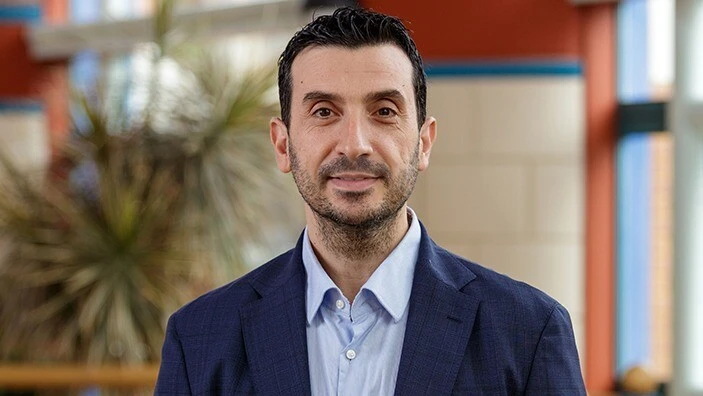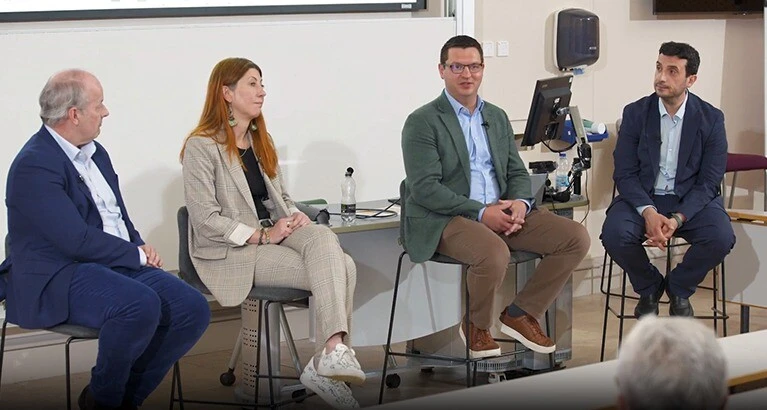Professor of Operations and Technology Management
PhD (Georgia Institute of Technology), BEng (National Technical University of Athens)
My research interests include business analytics and data-driven decision-making processes, technology and R&D management. I’ve worked closely on research projects with numerous executives from the biopharmaceutical industry, both in large pharmaceutical organisations and small biotech companies.
I’m a member of the Operations and Technology Management subject group at Cambridge Judge Business School, which focuses on practice-based research through partner organisations to address a wide spectrum of management challenges.

If you are interested in biotechnology, check out my recent book The Business of Biotechnology and and our Research Initiative on the biopharmaceutical industry.
My details
Contact details
Academic area
Professional experience
In addition to his academic work, Nektarios has worked closely on research projects with numerous executives from the biopharmaceutical industry, both in large pharmaceutical organisations and small biotech companies. He has also co-authored the book From Breakthrough to Blockbuster: The Business of Biotechnology.
Publications
Selected publications
- Betcheva, L., Kim, J.Y., Erhun, F., Oraiopoulos, N. and Getz, K. (2023) “Applying systems thinking to inform decentralized clinical trial planning and deployment.” Therapeutic Innovation and Regulatory Science, 57(5): 1081-1098 (DOI: 10.1007/s43441-023-00540-2)
- Markou, P., Kavadias, S. and Oraiopoulos, N. (2023) “Rival signals and project selection: insights from the drug development process.” Management Science (DOI: 10.1287/mnsc.2022.4642) (published online Jan 2023)
- Drakeman, D.L. and Oraiopoulos, N. (2020) “The risk of de-risking innovation: optimal R&D strategies in ambiguous environments.” California Management Review, 62(3): 42-63 (DOI: 10.1177/0008125620915289)
- Agrawal, V. and Oraiopoulos, N. (2020) “The role of decision rights in codevelopment initiatives.” Manufacturing and Service Operations Management, 22(4): 645-867 (DOI: 10.1287/msom.2019.0775)
- Neuberger, A., Oraiopoulos, N. and Drakeman, D.L. (2019) “Renovation as innovation: is repurposing the future of drug discovery research?” Drug Discovery Today, 24(1): 1-3 (DOI: 10.1016/j.drudis.2018.06.012)
- Schlapp, J.N., Oraiopoulos, N.and Mak, V. (2015) “Resource allocation decisions under imperfect evaluation and organizational dynamics.” Management Science, 61(9): 2139-2159 (DOI: 10.1287/mnsc.2014.2083)
Journal articles
- Betcheva, L., Kim, J.Y., Erhun, F., Oraiopoulos, N. and Getz, K. (2023) “Applying systems thinking to inform decentralized clinical trial planning and deployment.” Therapeutic Innovation and Regulatory Science, 57(5): 1081-1098 (DOI: 10.1007/s43441-023-00540-2)
- Markou, P., Kavadias, S. and Oraiopoulos, N. (2023) “Rival signals and project selection: insights from the drug development process.” Management Science (DOI: 10.1287/mnsc.2022.4642) (published online Jan 2023)
- Agrawal, V. and Oraiopoulos, N. (2020) “The role of decision rights in codevelopment initiatives.” Manufacturing and Service Operations Management, 22(4): 645-867 (DOI: 10.1287/msom.2019.0775)
- Drakeman, D.L. and Oraiopoulos, N. (2020) “The risk of de-risking innovation: optimal R&D strategies in ambiguous environments.” California Management Review, 62(3): 42-63 (DOI: 10.1177/0008125620915289)
- Oraiopoulos, N. and Kavadias, S. (2020) “Is diversity (un)biased? Project selection decisions in executive committees.” Manufacturing and Service Operations Management, 22(5): 869-1106 (DOI: 10.1287/msom.2019.0782)
- Neuberger, A., Oraiopoulos, N. and Drakeman, D.L. (2019) “Renovation as innovation: is repurposing the future of drug discovery research?” Drug Discovery Today, 24(1): 1-3 (DOI: 10.1016/j.drudis.2018.06.012)
- Neuberger, A., Oraiopoulos, N. and Drakeman, D.L. (2017) “Lemons, or squeezed for resources? Information symmetry and asymmetric resources in biotechnology.” Frontiers in Pharmacology, 8: 338 (DOI: 10.3389/fphar.2017.00338)
- Oraiopoulos, N. and Dunlop, W.C.N. (2017) “When science is not enough: a framework towards more customer-focused drug development.” Advances in Therapy, 34(7): 1572–1583 (DOI: 10.1007/s12325-017-0567-y)
- Schlapp, J.N., Oraiopoulos, N.and Mak, V. (2015) “Resource allocation decisions under imperfect evaluation and organizational dynamics.” Management Science, 61(9): 2139–2159 (DOI: 10.1287/mnsc.2014.2083)
- Oraiopoulos, N. and Kavadias, S. (2014) “The path dependent nature of R&D search: implications for (and from) competition.” Production and Operations Management, 23(8): 1450-1461 (DOI: 10.1111/poms.12198)
- Oraiopoulos, N., Ferguson, M.E. and Toktay, L.B. (2012) “Relicensing as a secondary market strategy.” Management Science, 58(5): 1022-1037 (DOI: 10.1287/mnsc.1110.1456)
Books, monographs, reports and case studies
- Drakeman, D.L., Drakeman, L.N. and Oraiopoulos, N. (2022) From breakthrough to blockbuster: the business of biotechnology. Oxford: Oxford University Press.
Awards and honours
- Winner, Best Working Paper Award (for the paper “Project selection and success: insights from the drug development process” (with P. Markou and S. Kavadias), INFORMS TIMES, 2018
- 2nd Prize, POMS PITM College Best Student Paper (Jochen Schlapp), 2015
- 3rd Prize, Best-Paper-Award Innovation Management, for the paper “Resource allocation decisions under imperfect evaluation and organizational dynamics” (with Jochen Schlapp and Vincent Mak), Strascheg Institute for Innovation & Entrepreneurship (SIIE), EBS Business School, 2015
- Cambridge Judge Business School Teaching Award, 2014
- NATO Scholarship for Doctoral Studies, 2006-2007
News and insights
Faculty news
Panel event explores VC’s role in the biotech sector
Helping to build lasting links between investors and biotech companies is a key role played by venture capital (VC) in the life sciences ecosystem. An event at Cambridge Judge Business School organised by Professor Nektarios (Aris) Oraiopoulos and VC firm Forbion focused on relationship-building and demystifying the role played by venture capital.
Governance, economics and policy
Put your resources to work: strategies for business success
Change is the very nature of business – especially successful businesses. Times change, customer needs change and the attractiveness of different market sectors change over time. Effective allocation of resources is essential to meet the demands of such change, finds research at Cambridge Judge Business School.
Entrepreneurship and innovation
Fighting cancer: how biotech companies are making an impact
Amid rising cancer concerns, scientists and entrepreneurs worldwide are racing to develop novel treatments. Independent biotech companies, often more cost-effective than pharmaceutical giants, play a crucial role in this uncertain landscape, exemplified by the success of checkpoint inhibitors – a ground-breaking class of cancer therapies.
Media coverage
Financial Times | 10 March 2022
FT business books – March edition
“From Breakthrough to Blockbuster”, a book co-authored by Nektarios Oraiopoulos, Associate Professor at Cambridge Judge Business School, was included in the March list of top business books of the month by the Financial Times, which says the book “tells the stories of a diverse group of startups, some of which grew into international businesses — although others failed — and outcompeted Big Pharma in bringing innovative new drugs to market. The authors explain why this happened, through a biotech ecosystem of academic research, venture capital groups, contract research organisations, capital markets and founding teams.”
India Education Diary | 24 February 2022
New book highlights how small biotech companies are outperforming big pharma
From Breakthrough to Blockbuster: The Business of Biotechnology, a new book co-authored by Nektarios Oraiopoulos, Associate Professor at Cambridge Judge Business School, shows how small, inexperienced entrepreneurial companies making up the biotech industry have created more life-changing medicines than all of the large pharmaceutical companies combined.
As Oraiopoulos explains: “The driving force was to bring together the complex reality of running a biotech company with the insights offered by the academic literature.”
Executive Courses | 10 September 2021
Executive education courses in data analytics
Dr Nektarios Oraiopoulos, University Lecturer in Operations Management at Cambridge Judge Business School, is quoted in the article. “Businesses and their leaders can use data to understand better, in an un-biased way, how they can create value for their customers,” he says. “This process enables companies to have a more focused version of the truth rooted in data, rather than having conflicting views and counterproductive arguments regarding what is good for the company.”
Forbes India, 21 December 2020
How drug companies can increase their R&D effectiveness
Fast Company, 30 April 2020
How open-source medicine could prepare us for the next pandemic
Pharma Voice, 1 February 2020
New pipeline pathways
Manufacturing Chemist, 14 August 2018
Limits of drug repurposin




